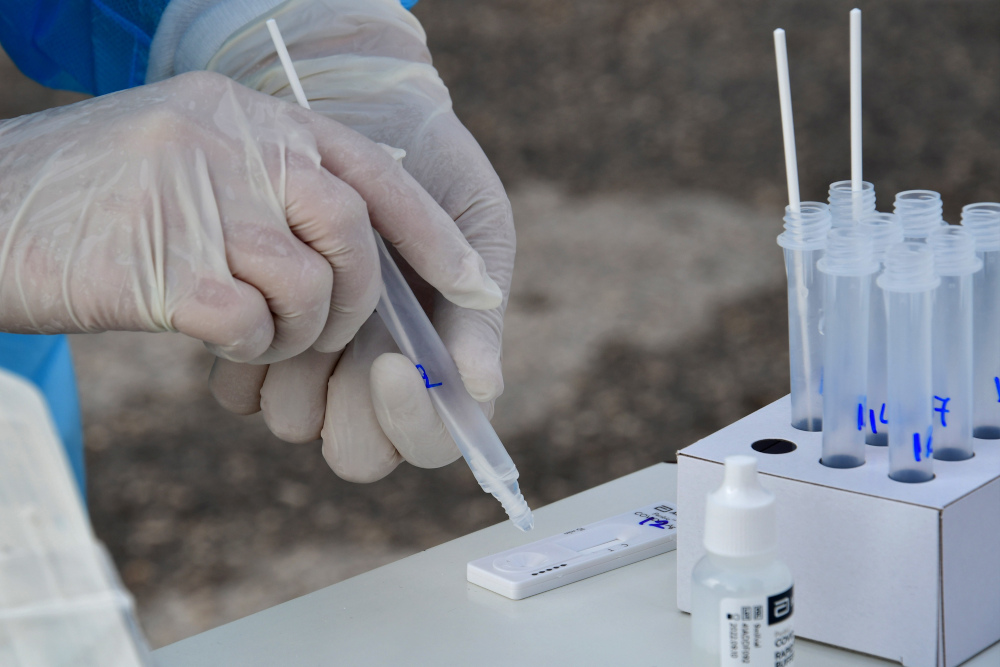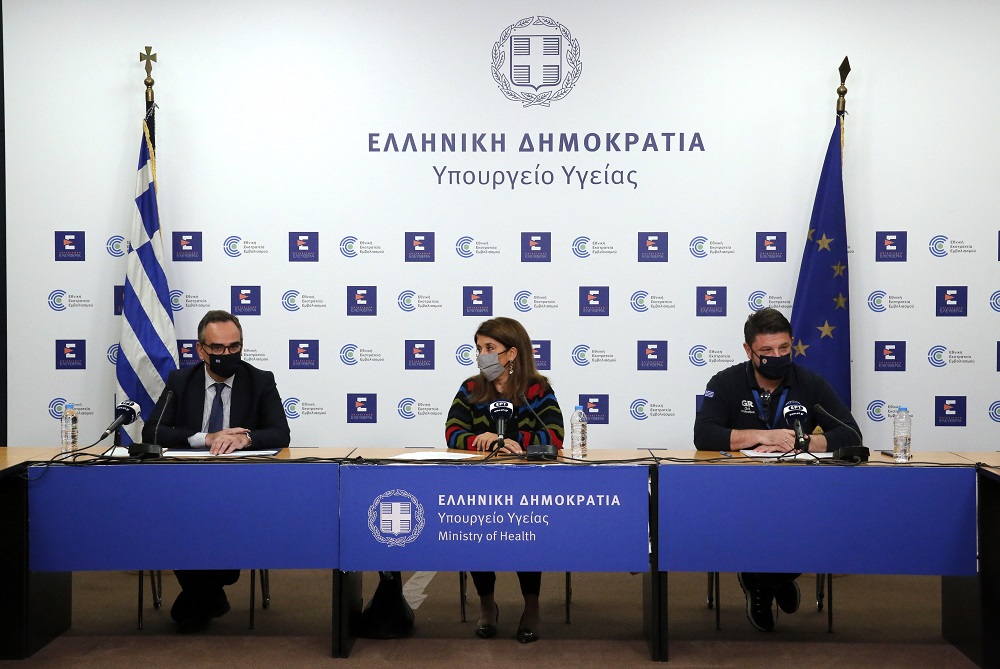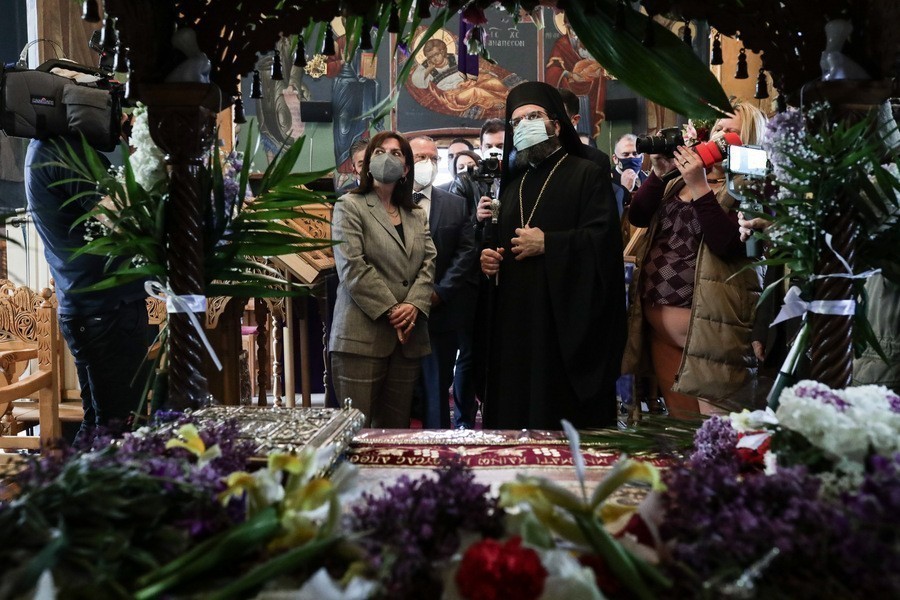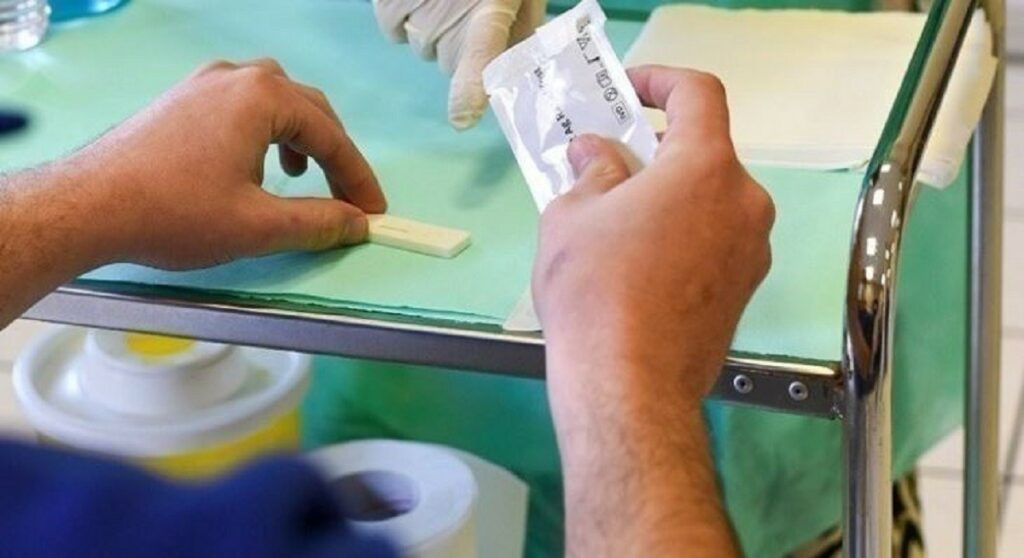
#Tags:
Easterself testsTravel restrictions over Easter will protect islands and villages, experts say

Epidemiologist and experts committee member Gkikas Magiorkinis [L] said that the active infection rate is marginally lower, but the National Health System remains under immense pressure.ANA – MPA/ANA – MPA/ALEXANDROS VLACHOS
The restrictions of travel between prefectures over Orthodox Easter (May 2) holidays will protect islands and villages from coronavirus infections, professor Vana Papaevangelou said during the live Friday briefing on the pandemic.
She also noted that people should wear double masks at church services and self test before joining family at the Easter table.
Papaevangelou also called high-risk and older age groups to become vaccinated as soon as possible. Nearly 65 pct of older people have either received the first of two doses or have set appointments set. But most ICU patients are younger; in addition, one in four is over 75 years old and not vaccinated.
The partial reopening of retail (with appointments ahead of time) and schools (with self-tests) has proven successful, she noted, while the active infections nationally has dropped to an assessment of 25,000.
“We are in a particularly fragile balance, and any relaxation right now, when the virus is everywhere, will push infections higher right away,” she said, noting that the occupancy of ICU beds is very high: 87 pct nationally, 89 pct in Attica Region, and 95 pct in Thessaloniki Region.
Speaking at the briefing also, epidemiologist and experts committee member Gkikas Magiorkinis said that the active infection rate is marginally lower, but the National Health System remains under immense pressure. He also stressed the high accuracy of the self tests, of up to 80 pct.
Indian strain
Magiorkinis also commented that an Indian variation of the SARS-CoV-2 virus found in Greece has not been classified as a dangerous mutation so far, but trace contacting and isolation has been carried out preventatively.
In a separate development, the National Public Health Organization’s (EODY) agency genome observation said a PCR test on March 22 revealed that a man living in Patras was infected with a strain of the virus dominant in India (B.1.617).
He had infection symptoms on March 16, and contact tracing did not reveal a history of travel or contact with any other confirmed infection.
He did not need to be hospitalized, his symptoms have receded, his isolation time has been completed, and EODY remains continually in contact with him, the agency said. Up to now, analyses show that the B.1.617 strain without the E484Q originated in the United States, and in California specifically.
Easter travel restrictions
Deputy Minister for Civil Protection & Crisis Management Nikos Hardalias outlined restrictions that will affect how citizens spend the upcoming Orthodox Holy Week and Easter weekend, speaking at the briefing.
Travelling among prefectures is already mostly forbidden, but as of Friday through May 10, citizens may only travel to another prefecture for the following five reasons and only after procuring the necessary documents:
– for work
– if moving to another prefecture permanently
– to attend a funeral
– for visitation rights in the case of divorced parents
– for medical emergencies
Concerning religious services and liturgies, the minister noted that self-testing is mandatory for all church staff, while attendees should wear double face masks, whether inside or outside of church. The Epitaphios procession on Good Friday (April 30) will be held by staff only at church courtyards, while attendees will stand by.
Curfew in Greece will start at 10 pm (from the current 9 pm) during Holy Week, and at 11 pm as of Easter Monday.
Up to 9 people maximum are allowed to gather at homes on Easter Sunday, or 12 if outdoors.
Hardalias also provided a regular update of the high-alert status on Greek regions.
Shopping malls
Meanwhile, Secretary General of Commerce & Consumer Protection Panagiotis Staboulidis said at the briefing that shopping malls and discount villages will reopen with restrictions across the country on Saturday (April 24). Customers will be allowed inside shops of malls and discount villages by appointment only (click-inside), through text (SMS) messages to 13032.
This includes the regions of Thessaloniki and Kozani, where the entire retail sector has stayed shut as opposed to the rest of the country.
Suggested shopping hours, as already announced, is 7 pm to 8:30 pm during the week. On Easter Week, Good Friday hours are 1:00 pm to 7:00 pm and on Holy Saturday 7 am to 6 pm.
In addition, all beauty centers will reopen on Saturday (April 24) in all areas of Greece, regardless if high risk or not, and observing health measures. As announced earlier, on May 3 all eating places, cafes (including traditional kafenia) and bars will be allowed to have outdoor seating for customers.
Self tests in public sector
All civil servants working with the public in person in offices or facilities beyond them must self-test every week as of April 26, Alternate Health Minister Vassilis Kontozamanis said on Friday.
At the regular live briefing, the minister said that these include priests, cantors and other church personnel, and some categories of employees who must self-test twice a week during Orthodox Easter services (April 26-May 5).
Private-sector employees will be self-testing to May 2, he said, while access to civil services by the public will continue to require an appointment.
Besides the free self tests picked up at pharmacies by insured people, results of rapid tests or PCR tests are also acceptable.
Source: ANA – MPA
Follow Hellas Journal at News Google
Greece registers 2,754 new coronavirus infections on Friday, 76 deaths; 819 on ventilators

